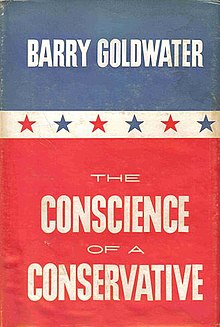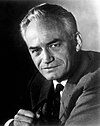The Conscience of a Conservative
 Cover of the first edition | |
| Author | Barry Goldwater (nominal) L. Brent Bozell Jr. (ghostwriter) |
|---|---|
| Subject | Politics, American conservatism |
| Publisher | Victor Publishing Co. [name used by Frank E. Simon, manager of the real publisher, viz., Publishers Printing Company, Shepherdsville, Kentucky] |
Publication date | 1960 |
| Media type | |
| Pages | 123 |
| OCLC | 1002492 |
The Conscience of a Conservative is a 1960 book published under the name of Arizona Senator Barry Goldwater who was the 1964 Republican presidential candidate. It helped revive the American conservative movement and make Goldwater a political star, and it has influenced countless conservatives in the United States, helping to lay the foundation for the Reagan Revolution of the 1980s.[1]
The book was largely ghostwritten by L. Brent Bozell Jr., brother-in-law of William F. Buckley Jr.[1][2] Bozell and Buckley had been members of Yale's debate team. They had co-authored the controversial book, McCarthy and His Enemies, in 1955. Bozell had been Goldwater's speechwriter in the 1950s and was familiar with many of his ideals.
Content
[edit]The 123-page book covers such topics as education, labor unions and policies, civil rights, agricultural policy and farm subsidies, social welfare programs, and income taxation. The book is considered to be a significant statement of politically and economically American conservative ideas which were to gain influence during the following decades.[1]
In his book, Goldwater states explicitly that there are "laws of God" and "truths of God" which inform his concept of 'conservatism' and under which the US should operate.[3]
Later editions
[edit]A half-century edition, edited by C.C. Goldwater (his granddaughter), with a foreword by George Will, and an afterword by Robert F. Kennedy Jr, was published by the Princeton University Press in 2007.
Namesake books
[edit]The book, and its title, continue to inspire contemporary political commentary.
- Mayer Schiller (1978), The (Guilty) Conscience of a Conservative
- In 2007, Paul Krugman entitled his own book The Conscience of a Liberal, saying in the introduction that he wanted his work to stand as a counterpoint to Goldwater's.[4]
- Zell Miller (2003), A National Party No More: The Conscience of a Conservative Democrat
- Wayne Allyn Root (2009), The Conscience of a Libertarian: Empowering the Citizen Revolution with God, Guns, Gambling & Tax Cuts.
- Gary Chartier (2011), The Conscience of an Anarchist: Why It's Time to Say Good-Bye to the State and Build a Free Society
- Jeff Flake (2017), Conscience of a Conservative: A Rejection of Destructive Politics and a Return to Principle
References
[edit]- ^ Jump up to: a b c Frohnen, Bruce (2006). American Conservatism: An Encyclopedia. Wilmington: Intercollegiate Studies Institute. pp. 179–80. ISBN 1-932236-43-0.
- ^ Hemmer, Nicole (2016). "Chapter 10: The Compromise". Messengers of the Right : conservative media and the transformation of American politics. Philadelphia. ISBN 978-0-8122-4839-5. OCLC 945028632.
{{cite book}}: CS1 maint: location missing publisher (link) - ^ Goldwater, Barry (1960). The Conscience of a Conservative. Victor Publishing Co.
- ^ Krugman, Paul (2007). The Conscience of a Liberal. New York: W.W. Norton & Co. ISBN 978-0-393-06069-0.
External links
[edit]- Full text: The Conscience of a Conservative

